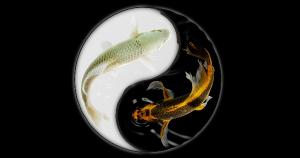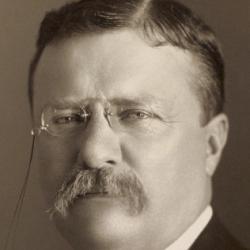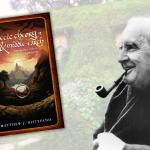Is truth subjective or objective; could it be both? What lies at the intersection of virtue theory and existentialism; does such an intersection even exist? For those that dig both ideas, but find tension in radical subjectivity vs. a more objective-based virtue ethic (living to one’s potential according to our nature as a social-rational animal); the Kierkegaard-Aristotle yinyang is the key. Actually, the fathers of virtue ethics and existentialism, especially in light of contemporary neuroscience, complement and balance each other.
Allow me to unpack this potentially bold assertion. First, a forewarning. Interpreting Kierkegaard within his background Christian theological/ethical framework, along with his broader existentialist “truth is subjective” theme is complex. To generalize, I’ll separate Kierkegaard’s Christian agenda with his broader and shared existential thought that “the truth is subjective”.
Aristotle, the father of virtue ethics, wrote the “moral virtue (or excellence) comes as a result of habit”. If this sounds familiar, it may ring a bell to the misattributed quote that “we are repeatedly what we do. Excellence, then, is not an act, but a habit”. Though misattributed to Aristotle, his own words make the same point that that excellence (or virtue) is not about intellectually knowing, it’s about doing, and doing repeatedly.
Existentialists would definitely love the doing aspect (vs. beliefs) for authenticity and subjectivity, but what is “the good” according to Aristotle and virtue theory? In short, our character becomes excellent by the repeated actualization of our potential as social and rational animals. Virtue is about our moral character and achieving true eudaimonia (well-being) actualizing our potential individually and collectively as a species. As pointed out by philosopher Massimo Pigliucci in Answers for Aristotle, eudaimonia is not “happiness”, but true well-being [1]. Hedonistic or material aims, though they might make you happy, are not virtuous, thus do not lead to eudaimonia. There are objectively virtuous choices (and not so virtuous ones) we can make to maximize our character, well-being, and the well-being of others – given our nature as social and rational animals.
Sounds noble, and much more nuanced than a rule-based deontological or consequentialist ethic (at least in my view). Still, whatever the moral realism (that there are objectively right/wrong actions), whether it be a virtue or or rule-based ethic, the existentialist (along with the moral skeptic) may still take aim.
But how does such an ethic move us; especially in times of obstacles, temptations, and distractions?
How could a virtue ethic (a grandfather grapping with the decision to stop smoking to be healthier and live longer for his family, for example) because its objectively better (an objective telos) for a social/rational animal truly move him? Perhaps this is just a fashionable social norm. Philosopher Roe Fremstedal makes an important high level points on Kierkegaard in that there seems to be alignment with a virtue/teleology ethic (moral character opposed to a rule-based ethic), but Kierkegaard’s being a personal telos, a subjective “final end” to be “sought for it’s own sake” [2].
So is the key to moral character a partially or uninspired (allegedly) objective teleology or an authentic subjective teleology? Kierkegaard reminds us of the crucial importance of the subjective truth coming alive. Though there are many complexities to Kierkegaard’s entire philosophy, I believe the link above provides an hidden gem in Kierkegaard – a balance between the yinyang of subjective and objective morality. Specifically, in Kierkegaard not denying an “imperative of knowledge and that through it men may be influenced”, but “then it must come alive in me, and and this what I now recognize as the most important of all” – there is incredible philosophical, psychological, and neuroscientific genius here – a yinyang between objective and subjective telos where Kierkegaard meets Aristotle.
The balance? That objective teleology and achieving true eudaimonia (well-being) actualizing our potential individually and collectively as a species – need not be opposed with the subjective teleology and the coming alive in our actions. Further, this yinyang balance between the subjective and the objective is actually what we see at the level of the brain and with contemporary neuroscience and moral psychology.
When we consider what is the good life? or what is the just act?, neuroscience informs us that certain regions of the brain drive certain inclinations. But like the concept of the yinyang, these are not disconnected dualities (or in this case, brain regions). There is a high degree of interplay. And like the yinyang, without balance there is missed actualization. Actualization of what, you might ask? Achieving eudaimonia of course!
Rationality can balance emotion; emotion inspires “the why” behind the rational pursuit of “what”. Simon Sinek’s best-selling book Start with Why beautifully lays out this interplay. The “why” (limbic system) is the emotive force; the “what” (neocortex) is the rational deliberation [3]. To get a bit more into the neuroscience weeds, Josh Greene’s impressive work on his trolley moral dilemmas show impersonal/deliberative judgements illustrate greater activity in the dorsolateral prefrontal cortex and other regions associated with “controlled cognition”, while personal judgements illustrate greater activity in medial prefrontal cortex, parts of the ventromedial prefrontal cortex, amygdala, and other regions associated with emotion. Greene’s “dual process theory” postulates that moral reasoning is not emotion vs. reason, but a highly nuanced and connected interplay [4].
 If Aristotle was correct that “all men by nature desire to know” (Metaphysics, Book I, Part I), then we should have revealed two key truths about human psychology: 1) that motivation plays an integral part in eudaimonia and 2) motivation is deeply interconnected with reason. According to neuroscientists Andrew Newberg and Anthony Demasio [5], that’s exactly what we’ve found. In Newberg’s words (bold my emphasis):
If Aristotle was correct that “all men by nature desire to know” (Metaphysics, Book I, Part I), then we should have revealed two key truths about human psychology: 1) that motivation plays an integral part in eudaimonia and 2) motivation is deeply interconnected with reason. According to neuroscientists Andrew Newberg and Anthony Demasio [5], that’s exactly what we’ve found. In Newberg’s words (bold my emphasis):
“Studies have suggested that the hippocampus and the amygdala serve to modulate emotions, but they also connect to the higher cortical areas where a variety of cognitive processes occur. Thus, it seems probable that the amygdala and hippocampus function as mediating structures between the limbic system and the cortex. In fact, there are a vast number of neural connections between the limbic system and the cerebral cortex. In this way, thoughts and experiences are transmitted from the cortex to the limbic system where there are given emotional value. From here, emotions allow us to interpret our experiences and generate behavioral responses.” [6]
So where does that leave the radically authentic existential hedonist? Perhaps she subjectively faces the absurdity of existence by making her own meaning? Fine and dandy, but there is good, better, and best way to be, given our nature as social/rational animals – says Aristotle and virtue theorists. And what of the virtue theorist in a rut? Rationally deliberating that I ought to do something because I am a member of the social-rational cosmopolis (and it would be objectively better for me and others given our natures); fine and dandy, but how will such virtues hold when the temptation, trials, tribulations, and absurdity of existence come knocking – ask Kierkegaard and existentialists.
As we now know that at the level of the brain, these are not separate dualities, but an interconnected yinyang – “truth”, is both objective and subjective. It’s objective in there being objectively right/wrong ways to live given our natures – and we can rationally deliberate and improve our characters and the people/world around us. It’s subjective in that it living virtuously has to come alive and be personally meaningful and sustainable – and that emotion is not only intangible for sustainable behavior, but it is the connected emotive force behind cognition.
Principles or emotions? Both, in turns out, with appropriate balance.
So why would virtue theorists need any existential input? If they’re in correct balance, wouldn’t their actions will thread this needle? And why would existentialists sharing Kierkegaard’s sentiments above need any input from virtue theorists? Couldn’t both be on the right track? Certainly, but they both remind us of the indispensability of an objective and subjective telos – the right principles, reinforced by emotion and vice versa.
Objectivity unchecked is too cold; subjectivity unchecked too hot (and quite irrational). In balance, both inform and inspire each other. And so the yinyang of balancing an “imperative of knowledge” (cognitive/yin) with it “coming alive in me” and “an idea in which to live and die” (emotional/yang) is the necessary balance. Too cold? Too much “what” (cognitive/yin); not enough “why” (emotional/yang). Too hot? Too much “why” (emotional/yang); not enough “what” (cognitive/yin).
Just Right: “Why” inspires (emotional/yang), but kept in check by “what” (cognitive/yin)
There is no objective telos vs. subjective telos – there is is only one interconnected brain within an interconnected species of social/rational animals. Back to the case of the grandfather quitting smoking, perhaps he finds the balance where the objective and the subjective ring true.
I will quit smoking so that I can be physically healthy and be present in my spouse’s, children’s, and grandchildren’s lives – and volunteer my time and money to end human trafficking (will you join me in this journey?). My staying away from smoking and being the best version of myself physically and mentally for myself and others – this is something I will live and die for.
Why would doing the subjectively authentic thing be opposed to the objectively true thing? Challenge the emotional/yin a bit (with the cognitive/yang) on the character of person you want to be and the legacy you’d like to leave behind. Not motivated enough in the objectively true? Keep seeking, learning, and doing the good, the true, and the beautiful and your mood will eventually catch up – and eventually – take the lead.
Notes:
[1] Pigliucci, Massimo. 2012. Answers for Aristotle: How Science and Philosophy Can Lead Us to a More Meaningful Life. New York: Basic, 8
[2] “Kierkegaard’s Views on Normative Ethics, Moral Agency, and Metaethics” in Jon Stewart (ed.), A Companion to Kierkegaard. Oxford: Wiley-Blackwell 2015 (Blackwell Companions to Philosophy), pp. 113-125
[3] Sinek, Simon. 2019. Start with Why: How Great Leaders Inspire Everyone to Take Action.
[4] Greene J.D. 2014. “Beyond point-and-shoot morality: Why cognitive (neuro)science matters for ethics”. Ethics. 124 (4): 695-726.
[5] Damasio, Antonio R. 2000. Descartes’ error: emotion, reason and the human brain. New York: Quill.
[6] Newberg, Andrew B. 2010. Principles of neurotheology. Farnham, Surrey, England: Ashgate Pub. 78-79
Image Credit
Photo by agus prianto on Unsplash

















